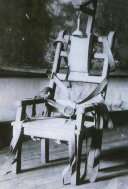To you my dear companions accept these lines I pray;
A most impartial trial has been occupied this day.
'Tis from your dying Broughton, to show his wretched fate,
Pray make your reformation before it is too late.
The loss of your companion will grieve your hearts full sore,
I know that my fair Ellen will my wretched fate deplore;
Thinking of those happy hours that now are past and gone,
That I, unhappy Broughton, would I had ne'er been born.
One day unto St. James's with large and swelling pride,
Each man had a flash woman walking by his side,
And at night we did retire unto some ball or play;
In these unhappy pleasures our time did pass away.
Brought up in wicked habits which wrought in me no fear,
How little did I think that my time had been so near;
But now I'm overtaken, and bound, condemned and cast to die,
Exposed a sad example to all those that pass me by.
O that I had but gone unto some far and distant clime,
That a gibbet post for Broughton would never have been mine;
But as for such like wishes they are vanity and vain,
Alas, it is but folly and madness to complain.
One night to try and slumber I closed my weeping eyes,
I heard a foot approaching which struck me with surprise;
I listened for a moment, a voice made this reply,
’Prepare thyself, Spence Broughton, tomorrow thou must die.’
O awful was the messenger, and dismal was the sound,
Like a maniac in distraction I rolled upon the ground;
My tears now flow in torrents, with anguish I am torn,
O poor unhappy Broughton, would I had ne'er been born.
Farewell, my wife and children, to you I bid adieu,
I never should have come to this had I stayed at home with you;
But I hope through my Redeemer to gain the happy shore;
Farewell, farewell for ever, Spence Broughton is no more.
Spence Broughton is no more.
A most impartial trial has been occupied this day.
'Tis from your dying Broughton, to show his wretched fate,
Pray make your reformation before it is too late.
The loss of your companion will grieve your hearts full sore,
I know that my fair Ellen will my wretched fate deplore;
Thinking of those happy hours that now are past and gone,
That I, unhappy Broughton, would I had ne'er been born.
One day unto St. James's with large and swelling pride,
Each man had a flash woman walking by his side,
And at night we did retire unto some ball or play;
In these unhappy pleasures our time did pass away.
Brought up in wicked habits which wrought in me no fear,
How little did I think that my time had been so near;
But now I'm overtaken, and bound, condemned and cast to die,
Exposed a sad example to all those that pass me by.
O that I had but gone unto some far and distant clime,
That a gibbet post for Broughton would never have been mine;
But as for such like wishes they are vanity and vain,
Alas, it is but folly and madness to complain.
One night to try and slumber I closed my weeping eyes,
I heard a foot approaching which struck me with surprise;
I listened for a moment, a voice made this reply,
’Prepare thyself, Spence Broughton, tomorrow thou must die.’
O awful was the messenger, and dismal was the sound,
Like a maniac in distraction I rolled upon the ground;
My tears now flow in torrents, with anguish I am torn,
O poor unhappy Broughton, would I had ne'er been born.
Farewell, my wife and children, to you I bid adieu,
I never should have come to this had I stayed at home with you;
But I hope through my Redeemer to gain the happy shore;
Farewell, farewell for ever, Spence Broughton is no more.
Spence Broughton is no more.
envoyé par Bernart - 25/7/2013 - 13:14
×
![]()








Una “broadside ballad” di autore anonimo incisa da Ewan MacColl con Peggy Seeger nel disco del 1957 intitolato “Bad Lads And Hard Cases - British ballads of crime and criminals”
Una canzone sulla ferocia della “giustizia”, tanto più cattiva quanto più sfigato è colui sul quale si abbatte, così crudele da inseguire le proprie vittime anche dopo la morte per esecuzione…
Spence Broughton era un contadino del Lincolnshire, sposato con tre figli.
Ad un certo punto, intorno ai 40 anni, probabilmente decise che si era scassato le palle di quella vita di stenti, mollò la famiglia e si trasferì a Sheffield vivendo di gioco d’azzardo e piccoli furti.
All’inizio del 1791 Spence Broughton decise che era venuto il momento di dare una svolta alla sua meschina carriera criminale e con un complice progettò una rapina alla diligenza postale che serviva tra Sheffield and Rotherham. I due “highwaymen” ebbero successo, nessuno si fece male ma il bottino non fu gran che: un assegno di 123 sterline. Spence Broughton ed il suo sodale si recarono a Londra per incassarlo senza dare nell’occhio e, già che c’erano, fecero un altro paio di piccole rapine. Furono quasi subito arrestati e incarcerati. Il complice evase e fece sparire le sue tracce e così Broughton rimase l’unico ad andare a processo.
Nel marzo del 1792 Spence Broughton, rapinatore, certo, ma che non aveva mai torto un capello a nessuno, fu condannato a morte per impiccagione nel corso di un’udienza che durò un’oretta. Il giudice stabilì anche una pena accessoria, che il corpo senza vita di Broughton fosse in seguito “gibbeted”, cioè “ingabbiato” e nuovamente appeso nel luogo preciso dove era avvenuta la rapina, ad Attercliffe.
I resti di Spence Broughton rimasero lì a penzolare in catene non per alcuni giorni, non per alcune settimane e nemmeno per alcuni mesi… quel che rimaneva del rapinatore Spence Broughton rimase esposto al pubblico per ben 36 (trentasei) anni, fino al 1827, quando il nuovo proprietario di quelle terre decise che era venuto il momento di smetterla con quella pena senza fine e di dare una degna sepoltura al povero Spence.
Una storia di orribile accanimento della giustizia che, per certi versi, ricorda quella nostrana dell’anarchico Giovanni Passannante, fatto marcire in carcere e i cui resti (cranio e cervello) hanno trovato pace solo nel 2007, dopo essere stati esposti per 70 anni presso il museo criminologico di Roma.